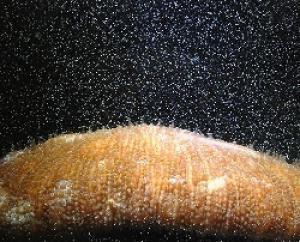Japanese coral transgender in the seabed
The transsexual plants and bees are the same. Even the fish that are pressured by the environment change their gender. But Professor Yossi Loya of Tel Aviv University's Department of Zoology is the first in the world to discover that Japanese sea corals also convert sex.
His research could provide the bottom line for the survival of fragile marine corals, which play an essential role for all types of marine life. Coral is now seriously threatened by global warming.
At times of pressure, such as extremely hot temperatures, female mushroom corals (also known as fungiid corals) have changed their sex so that most coral populations are male. According to the world famous coral researcher, the benefit of this is that male corals can quickly cope with more pressure when resources are limited. Obviously when the time became fierce, naturally giving destiny to the man.
Professor Loya said: 'We believe that, like orchids and some species of plants, transgender sex in corals increases general adaptability, along with the important role of reproductive flexibility. in deciding the success of evolution '.
The will to fight and survive
Professor Loya said: 'One of the evolutionary strategies that some corals use seems to be the ability to switch from female to male. When they are male, they can experience difficult years, then when the situation becomes more favorable they become children again. When they are female, they lose more energy. There is a phased gender-changing ability to allow species to maximize their reproductive efforts. '

The coral of C. echinata releases eggs into the water.( Photo: Image courtesy of Tel Aviv University)
Although coral is a member of the animal kingdom, it can act as a tree. Both males and females are stationary forms, unable to move when living conditions become difficult.
In harsh environmental conditions, male corals can overcome storms. According to Professor Loya, 'maintaining male corals - from an evolutionary perspective - is less expensive. They are 'cheaper' in terms of the gonads and energy required to maintain the body. ' He also emphasized that this hypothesis may not be suitable for humans, even those who choose sex change.
Admired by beauty divers, corals also provide habitat for thousands of other underwater creatures. Without coral reefs, many creatures living in the water will perish. For millions of people living in the tropics, coral reef marine life is their daily source of protein.
Maintaining the food chain and natural wonders will exist
However, the destruction of coral reefs is expected to continue under the effects of global warming. About a quarter of the world's coral reefs have been lost. Professor Loya's discovery could bring new perspectives to scientists in developing coral reproduction campaigns during the climate-change periods predicted by scientists.
'This knowledge can help coral breeders. San lake fungiid is a form of hard corals that can develop in captivity. Once we know its reproductive form, we can develop hundreds of thousands of individuals. ' Professor Yossis Loya has been studying corals for over 35 years, and he is also currently involved in coral restoration projects in the Red Sea. He also won the prestigious Darwin Medal, which is awarded every four years by the International Coral Protection Association, for people who have dedicated their lives to studying coral reefs.
- Brain scan reveals the truth about transgender people
- The first female transgender person in the world to breastfeed
- The real life of Lili Elbe - The world's first transgender
- Discovery of the mysterious 'coral forest' area over 1000 years old, 2,300m deep in the seabed
- Exotic transgender animals: Body collisions are ... transgender
- Uncover the mysterious veil of volcanic ranges underneath the Coral Sea
- Indonesia uses coral rock to protect corals
- 'Living wonders' in the Spratlys (2)
- DNA denounced transgender people who mass murdered after 22 years
- Strange sea creatures in the coral reef
- Successful uterine transplant surgery, men can become pregnant immediately
- Map the global coral
 Surprised: Fish that live in the dark ocean still see colors
Surprised: Fish that live in the dark ocean still see colors Japan suddenly caught the creature that caused the earthquake in the legend
Japan suddenly caught the creature that caused the earthquake in the legend A series of gray whale carcasses washed ashore on California's coast
A series of gray whale carcasses washed ashore on California's coast Compare the size of shark species in the world
Compare the size of shark species in the world